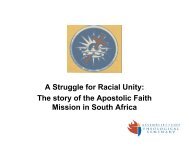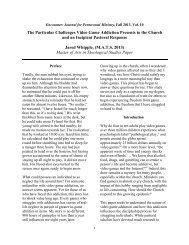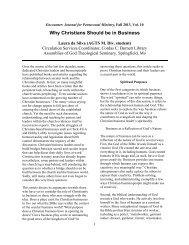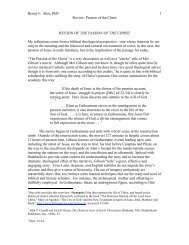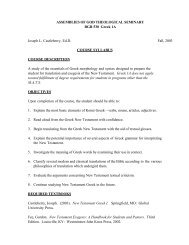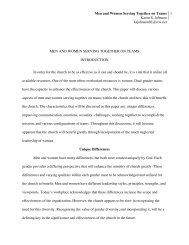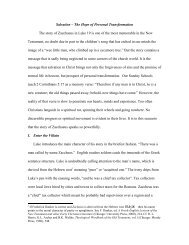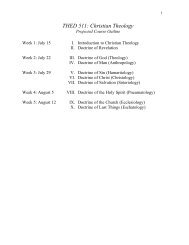Encounter: Journal for Pentecostal Ministry - Assemblies of God ...
Encounter: Journal for Pentecostal Ministry - Assemblies of God ...
Encounter: Journal for Pentecostal Ministry - Assemblies of God ...
Create successful ePaper yourself
Turn your PDF publications into a flip-book with our unique Google optimized e-Paper software.
ought His disciples into that place <strong>of</strong> rest<br />
as well. In Mark 6:31, the disciples had just<br />
returned from the preaching mission on<br />
which Jesus had sent them, and “many were<br />
coming and going, and they had no leisure<br />
even to eat.” In response, Jesus invites them<br />
to “Come away by yourselves to a desolate<br />
place and rest a while” (v. 31b).<br />
As the gospel entered new contexts within<br />
the Roman Empire, it encountered new<br />
challenges. In Judea, the world still stopped<br />
on the Sabbath day, which made it easy <strong>for</strong><br />
Jews to practice the Sabbath, even if<br />
tradition had changed its meaning. In Greek<br />
and Roman contexts, however, not every<br />
laborer was given such opportunity. Paul’s<br />
letter to the church in Rome seems to<br />
indicate that not all Christians were<br />
practicing the Sabbath (Rom. 14:5-6).<br />
Many Christians assume that Paul dismissed<br />
the Sabbath. Indeed, in several places Paul<br />
warns against judging others based on<br />
whether or not they kept the Sabbath. 25<br />
However, he does not eliminate the concept<br />
<strong>of</strong> Sabbath. For Paul, the Sabbath<br />
<strong>for</strong>eshadows the fulfillment <strong>of</strong> rest in Christ<br />
(Col. 2:17). There<strong>for</strong>e, Christians are not<br />
bound to a legalistic interpretation <strong>of</strong> the<br />
Sabbath, but still receive its benefit. In fact,<br />
the fulfillment <strong>of</strong> Sabbath rest in Christ<br />
invites Christians to enter rest even more<br />
deeply.<br />
The Sabbath <strong>for</strong> American Christians<br />
What, then, does Sabbath mean <strong>for</strong> modern<br />
American Christians? Certainly it should not<br />
take on the legalism <strong>of</strong> Jesus’ day. As Paul<br />
advised, it also need not be practiced on any<br />
particular day. However, the depth <strong>of</strong><br />
meaning and the value <strong>of</strong> the Sabbath, as<br />
expressed in the Old Testament, are to be<br />
consummated in Christ, not lost. In Christ,<br />
Christians may reinterpret the Sabbath in an<br />
even broader sense, applying it to life as a<br />
6<br />
whole, rather than limiting it to a single<br />
timeframe. In whatever way Christians<br />
practice the Sabbath, it must include a<br />
period <strong>of</strong> regular, genuine rest which<br />
incorporates a time <strong>for</strong> guilt-free relaxation<br />
from work <strong>of</strong> all kinds. It is not a time to<br />
“catch up” on housework or other chores. It<br />
is a time <strong>for</strong> simple enjoyment <strong>of</strong> life and<br />
creation.<br />
The Christian practice <strong>of</strong> Sabbath must also<br />
include a drastic, counter-cultural slowing <strong>of</strong><br />
pace. Busyness is incompatible with the<br />
model <strong>of</strong> ministry and spirituality<br />
exemplified in Christ. The American sense<br />
<strong>of</strong> endless obligation and need <strong>for</strong> multitasking<br />
prevents the kind <strong>of</strong> slowness which<br />
spiritual growth requires. “Holiness can only<br />
be experienced by providing it with the<br />
occasion, which is setting aside all other<br />
preoccupations.” 26 John Ortberg reports a<br />
conversation in which he asked his spiritual<br />
mentor what was necessary to become<br />
spiritually healthy. In response, his mentor<br />
advised him, “You must ruthlessly eliminate<br />
hurry from your life.” 27 The practice <strong>of</strong><br />
Christian Sabbath today must include this<br />
ruthless elimination <strong>of</strong> hurry.<br />
Richard Swenson suggests the concept <strong>of</strong><br />
“margin.” Many Americans overbook their<br />
time, budget, body, and emotions. When<br />
running at 100 percent or more, any<br />
interruption to the schedule, any unplanned<br />
delay, or even an unexpected opportunity,<br />
causes stress and pain rather than the Christlike<br />
response <strong>of</strong> love. Instead, Swenson<br />
suggests that people should intentionally<br />
leave wide “margins” in their time and<br />
energy so that when the unexpected<br />
happens, there is room to breathe—room to<br />
respond with love. 28<br />
The Christian practice <strong>of</strong> Sabbath also<br />
challenges American believers to increase<br />
their biblical understanding <strong>of</strong> calling in



